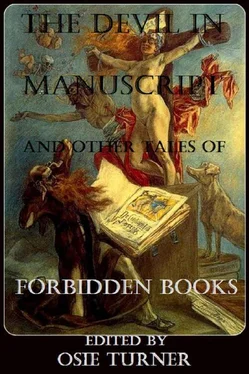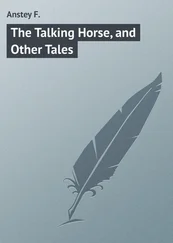“And then, Smithers, the truth of his words flashed through my brain like lightning. What was the sensation of death? All my life I had been straining toward that unknown knowledge without realizing it; all my life I had known instinctively that dead things guard a precious secret. Without this secret, I was a mere scribbler forced to give shopworn offerings to the muse. What was the sensation of death? If I knew that, unborn millions would live to fear me; my shadow would rest like black plumage over the world; and life, once gay and carefree, would shudder on the brink of the tomb!
“But now red rage flamed up in me—blind rage at my own impotence. How I hated this man who had pointed out the truth! My only thought was to destroy that brain which had grappled and was grappling with mine.
“Grasping the heavy poker which leaned against the grate, I struck him on the head with all my might The iron bit into his skull and he fell senseless at my feet. But blind fury still possessed me. I struck again and again till his face was beaten into an unrecognizable mass.
“And then I stopped, ashamed. I knew that he had escaped; that my first blow had opened the door for him; that he was now safe from me, quite safe and the possessor of a priceless knowledge. And I dared not look into his eyes for fear that I would see that relentless question: ‘What was the sensation of death?’
“You know the rest, Smithers. I dressed his body in my clothes. I slipped my ring on his finger and later that night I had him thrown into the river. Then I left the city by stealth. Solitude has always appealed to me. I took to the woods, grew a beard and soon became familiar with my new life.”
He paused and regarded me solemnly for a moment. “Tell me,” he muttered, “why did Huntington call me a failure? Do you think that I am a failure, Smithers? I have tried so hard and now…” He shook his head sadly. “We, who serve, must give everything—everything!”
And now a new terror was added to my others. There remained no doubt in my mind. Looking up into his thin, convulsed face, I realized that Burgess Martin was mad. There he sat, his eyes fixed on mine with a speculative stare—a madman with the red stain of murder in his brain! How long before his slender, crimson finger tips would be at their wonted trade? How long had I to live?
“All that I have told you happened such a long, long time ago,” Martin resumed in a weary voice. “Now nothing amuses me—nothing! For ten unbearable years that relentless question has burned my brain like molten lava. The world, no doubt, would think me mad, but the moon knows better. To-night, as I sat by the fire, she bent down from the heavens and whispered to me, telling me how I could find the answer and be as wise as she and other cold things. Just think what it must mean to be wise as the moon!
“But do not imagine that I seek to learn this truth for myself alone. Ah, no, I do it for Art—I do it so that she may become all-powerful, so that she may rule over the dead as over the living. I shall leave a message behind which will open those dark portals. No longer shall the breath from the tomb be heavy laden with mystery. The time has come for my last sacrifice!”
All this time his eyes had been fixed on me; his face had been so close to mine that I could feel his hot breath on my cheek. But now he rose and straightened himself to his full height. Slowly his right hand stole downward till it rested on the hilt of the hunting knife suspended from his belt. A moment later I saw the sharp blade gleam dully in the feeble lamplight.
“Tell me,” he said softly, bending forward as a mother might stoop to caress her sleeping child. “Tell me, would you not like to go? Paul has trod that path; Huntington laughed as I struck him down. Surely you will not remain behind?”
And then, for the first time in all that terrible night, my courage deserted me. “Help!” I shouted. “Help!” But the moaning of the wind, that everlasting mourner, was my only answer.
“You were always a weakling,” Martin said with a sneer strong in his voice. “But I will not press you. You shall be my messenger to the world.”
Now he bent down lower still, and, with the speed o£ lightning, passed the sharp blade of the hunting knife across the arteries in his left wrist. Instantly a warm stream of blood fell on my upturned face. At this new horror, everything grew black before my eyes. I fainted.
When I regained consciousness, Martin still lived, although his blood was dry on my cheek. He sat beside the table in the center of the room, bending over it and writing hurriedly. His left arm hung motionless by his side. From the wrist a dark ribbon of blood stole downward over the hand and, separating at each finger, dripped to the floor. The storm had died down, the rain had ceased. I could distinctly hear the scratching sound his pencil made while traveling over the paper, the intermittent pattering of blood drops on the loose boards at his feet.
For the moment I was incapable of thought. I stared stupidly at this absorbed figure, scarcely realizing the struggle going on between mind and body, between life and death. And then the pencil—that swiftly moving pencil riveted my gaze. I felt that it was being pursued, that pencil; that it was a tiny terror-stricken creature, fleeing, dodging this way and that, leaping forward in a frenzy to escape. But what pursued it? What implacable destiny waited for it silently at the end of the page? Now it faltered, now it sped on again, now it moved jerkily forward for an inch or two. And then—why, then it stopped! The race was over!
Burgess Martin sank lower and lower in his chair. The pencil slipped from his fingers to the floor. He tried to reach for it, to pick it up again; but strength was lacking. Soon his chin rested on his breast.
But how long he took to die! The lamplight was dying with him, slowly, surely, while dark shadows, clustering in the corners, grew bolder now and crept out in solemn, hovering groups. I saw them gathering about the doomed man, silently stealing forward, bending and bowing, mocking his weakness and futility of effort like evil marionettes. And once I distinctly heard a low laugh as though one were merry in the presence of death and would hide it from the world.
But now, as though spurred to final effort, Burgess Martin raised his head. He moved; he shook off death; he arose unsteadily to his feet. For an instant he stood there, grim and silent, his arms outstretched as though awaiting the cold embraces of his mistress.
“I have not the strength,” he murmured. And then in a louder tone: “Forgive me if I have failed in this. I have tried so hard I—”
And now there came a gust of wind from the lake. It tore the blanket from the doorway. It entered. It breathed upon the lamp and there was blackness. There followed the sound of a heavy fall and then silence.
I have but little more to tell. On the following day Doctor Street arrived at Naples, and, hearing that I was in Bill Pete’s cabin, hired a canoe and paddled across. He found me tied to my bunk and raving in a high fever. On the floor, within a few feet of the table, lay the stiffening remains of Burgess Martin.
Several weeks later, after I had recovered my health and strength, Dr. Street gave me further details. It seems that Martin’s usually somber face was transfigured by a strange, unearthly smile and that he held in his right hand, crumpled up into a ball, a sheet of paper on which he had succeeded in writing several sentences. I have that sheet of paper before me now and, as I am convinced that his last message can do no harm in its unfinished state, I quote from it verbatim:
I am dying, slowly, painlessly. From me are falling, one by one, the dry husks of life. A great weakness, which clarifies the senses, is stealing over me. I am a child again—a child who stands on the tiptoe of expectancy. Something is about to happen. What? I do not know. And yet I feel so sure of approaching freedom. I have lived my life behind iron bars; and now—why, now I smell the sea!
Читать дальше












